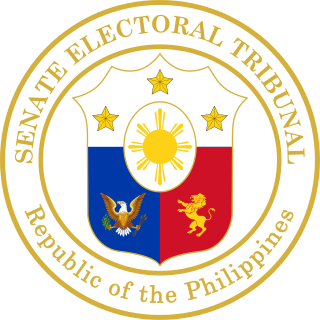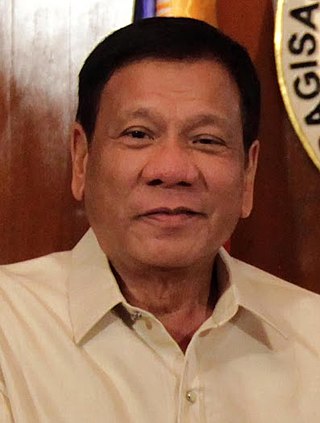Related Research Articles

The Autonomous Region in Muslim Mindanao was an autonomous region of the Philippines, located in the Mindanao island group of the Philippines, that consisted of five predominantly Muslim provinces: Basilan, Lanao del Sur, Maguindanao, Sulu, and Tawi-Tawi. It was the only region that had its own government. The region's de facto seat of government was Cotabato City, although this self-governing city was outside its jurisdiction.

Elections for all positions in the Philippines above the barangay were held on May 10, 2010. The elected president is Benigno Aquino III, the 15th President of the Philippines, succeeding President Gloria Macapagal Arroyo who was barred from seeking re-election due to term restrictions. The successor of Vice-President Noli de Castro is Jejomar Binay, the 13th Vice President of the Philippines. The legislators elected in the 2010 elections joined the senators of the 2007 elections and comprised the 15th Congress of the Philippines.

Telephone numbers in the Philippines follow an open telephone numbering plan and an open dial plan. Both plans are regulated by the National Telecommunications Commission, an attached agency under the Department of Information and Communications Technology (DICT).

The Christian And Missionary Alliance Churches of the Philippines (CAMACOP) is a Christian evangelical group in the Philippines that originated from The Christian and Missionary Alliance (C&MA). It is one of the largest evangelical groups in the Philippines.
Autonomous Region in Muslim Mindanao general elections was held in the ARMM for the regional governor, vice-governor posts and election of members of the ARMM Regional Legislative Assembly on August 11, 2008. The electronic voting used is the first in Philippines election history. The ₱500 million COMELEC's "ARMM balloting" is a pilot program for the 2010 national polling.

Koko Pimentel versus Migz Zubiri better known as Pimentel v. Zubiri is a SET Case No. 001-07 that resolved the election protest filed by Koko Pimentel after the proclamation of Migz Zubiri as senator after the 2007 Philippine Senate election. The Senate Electoral Tribunal (SET) on June 19, 2008, resolved to proceed with the election protest of Pimentel against Senator Zubiri: "Indeed, there is reasonable ground to believe that the outcome of the case could affect the officially proclaimed results of the 12th senatorial position in the 2007 Senate election, hence, the election protest case deserves further proceedings by the tribunal.

The 2010 Philippine presidential and vice presidential elections were held on Monday, May 10, 2010. The ruling President of the Philippines, Gloria Macapagal Arroyo, was ineligible to seek re-election as per the 1987 Constitution, thus necessitating an election to select the 15th President.

The 2010 Philippine House of Representatives elections were held on May 10, 2010, to elect members to the House of Representatives of the Philippines to serve in the 15th Congress of the Philippines from June 30, 2010, to June 30, 2013. The Philippines uses parallel voting for seats in the House of Representatives; a voter has two votes: one for a representative from one's legislative district, and another for a sectoral representative via closed lists under the party-list system, with a 2% election threshold and 3-seat cap, when the parties with 2% of the national vote or more not meeting the 20% of the total seats, parties with less than 2% of the vote will get one seat each until the 20% requirement is met.

The following is the official canvassing of votes by the Congress of the Philippines for the 2010 Philippine presidential and vice presidential election. The canvassing, originally scheduled to start on May 31, started on May 25, 2010, and ended on June 9, 2010. The Congress is mandated to declare a winner 30 days after the elections.
Synchronized Barangay and Sangguniang Kabataan (SK) elections were held on October 25, 2010, in the Philippines. The electorate elected in nonpartisan elections, the Barangay chairman also known as the Punong Barangay and members of the Sangguniang Barangay for voters aged 18 and above. While voters aged 15 to 17 voted for the chairman of the Sangguniang Kabataan and members of the Katipunan ng mga Kabataan. Due to funding issues, the Commission on Elections opted to use the manual voting system instead of the automated elections as was done in the last 2010 national elections.

A general election in the Philippines took place on May 9, 2016, for executive and legislative branches for all levels of government – national, provincial, and local, except for the barangay officials.
Since the 2008 Autonomous Region in Muslim Mindanao general election, the voters in the Philippines have to shade the oval that was indicated before the candidate's name, and a voting machine manufactured by Smartmatic automatically counts each ballot as it is fed into it. The results are then printed as the election return and sent electronically to the city or municipal Board of Canvassers.

The 2019 Philippine House of Representatives elections were the 35th lower house elections in the Philippines. They were held on May 13, 2019, to elect members to the House of Representatives.

The 2019 Philippine general election was conducted on May 13, 2019. A midterm election, those elected therein will take office on June 30, 2019, midway through the term of President Rodrigo Duterte.

The 2019 Bangsamoro autonomy plebiscite was a two-part plebiscite held in Mindanao, Philippines, that ratified the Bangsamoro Organic Law (BOL) and replaced the Autonomous Region in Muslim Mindanao (ARMM) with the Bangsamoro Autonomous Region in Muslim Mindanao (BARMM), as well as the scope of the said region.

The 2022 Philippine general election took place on May 9, 2022, for executive and legislative branches of the government – national, provincial, and local, except for the barangay officials.
COVID-19 community quarantines in the Philippines were series of stay-at-home orders and cordon sanitaire measures that have been implemented by the government of the Philippines through its Inter-Agency Task Force for the Management of Emerging Infectious Diseases (IATF-EID).
Local elections in the Philippines took place on May 9, 2022. These were conducted together with the 2022 general election for national positions. All elected positions above the barangay (village) level but below the regional level were disputed. The following 18,180 positions will be disputed:
2023 in the Philippines details notable events that have occurred, or are scheduled to take place, in the Philippines in 2023. The COVID-19 pandemic, which largely defined the preceding three years, continued into 2023.
References
- ↑ Pazzibugan, Dona (2010-05-08). "SC: It's all systems go; Court junks petitions to postpone polls". Philippine Daily Inquirer. Archived from the original on 2010-05-10. Retrieved 2010-05-08.
- ↑ "Failure of elections in 4 Lanao del Sur towns". abs-cbnNEWS.com. 2010-05-10. Retrieved 2010-05-10.
- ↑ "IN THE MATTER OF POSTPONEMENT OF ELECTIONS IN SOME AREAS IN WESTERN SAMAR, ILOILO, SARANGGANI AND DECLARATION OF FAILURE OF ELECTIONS IN SOME AREAS IN LANAO DEL SUR AND BASILAN DURING THE MAY 10, 2010 AUTOMATED NATIONAL AND LOCAL ELECTIONS". Commission on Elections . 2010-05-10. Retrieved 2010-05-26.
- ↑ "Ballot, PCOS problems delay voting in some provinces". abs-cbnNEWS.com. 2010-05-10. Retrieved 2010-05-10.
- ↑ "Close of voting hours extended". Business World. 2010-05-10. Retrieved 2010-05-10.[ permanent dead link ]
- ↑ "Explosions signal voting in Marawi City". abs-cbnNEWS.com. 2010-05-10. Retrieved 2010-05-10.
- ↑ "Groups clash in Maguindanao poll center; 2 die". abs-cbnNEWS.com. 2010-05-10. Retrieved 2010-05-10.
- ↑ "Bomb explodes in La Union polling booth, 4 hurt". abs-cbnNEWS.com. 2010-05-10. Retrieved 2010-05-10.
- ↑ "2 killed in Bacoor shooting". Inquirer Southern Luzon. 2010-05-10. Archived from the original on 2010-05-13. Retrieved 2010-05-10.
- ↑ Marlon Ramos; Katherine Evangelista (2010-05-10). "Polls 'generally peaceful'—AFP, PNP officials". INQUIRER.net. Archived from the original on 2010-05-13. Retrieved 2010-05-10.
- ↑ Cueto, Francis Earl (2010-05-14). "65 PCOS machines discovered in Antipolo". The Manila Times . Archived from the original on 2010-05-17. Retrieved 2010-05-21.
- ↑ Beltran, Jill (2010-05-18). "Opening of PCOS machines in Antipolo (6:12 p.m.)". Sunstar . Archived from the original on 2010-05-17. Retrieved 2010-05-21.
- ↑ "60 controversial PCOS machines now in Senate custody". GMANews.tv. Yahoo! Philippines News. 2010-05-19. Retrieved 2010-05-21.